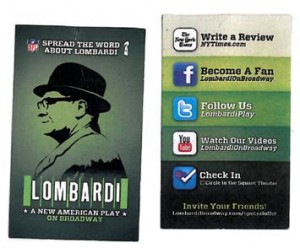
The marketing piece for Lombardi on Broadway asks its audience to engage in several ways, including "write a review."
My friend emailed this Lombardi marketing piece to me this week, with the subject line: “is ‘write a review’ naff?”
He was talking about the Reader Review section of the New York Times, where regular people (like you and me!) can add our two cents about a theater production. It runs online only, under the Times’ own review, or under their listing.
Since I am old-ish, I recall a time when the idea of Reader Reviews had producers in a snit. There were concerns that previews would be “reviewed” without taking into account that they were previews. There was concern that bad word of mouth would spread faster.
It appears, however, the opposite happened. The taste of Broadway theater-goers (and I would argue Off and Off Off as well) did not echo that of the Times’ critics. And often strong word of mouth keeps a show humming along more than than a blissful critical response. Times change indeed.
So what Lombardi producers are doing is two-fold.
First, they are asking their audience to engage with them–follow them on Twitter, friend them on Facebook, write a review at nytimes.com! Audience members, once relegated to a passive role, are actively involved in the success of a show.
Second, the audience reviews insulate the show somewhat against a negative review from a critic. While Ben Brantly may hate it, this other guy who sounds more like me had a great time. It takes critical power and disperses it to the audience.
Of course, it’s a gamble. Audiences may hate it and that could dilute a rave review. But I think those who love it are more inclined to support. Unless a production is anger-inducing awful, I don’t think those who simply didn’t enjoy it would be moved to spend more of their time panning it online.
Now, this doesn’t mean everyone and their Aunt Fanny should jump online and write glowing stuff about your production on the Times’ site. In fact, faux reviews are often easily spotted, and can backfire. Best to get the honest feedback.
The Times is one of the few sites that allow reader reviews and ratings, and I don’t think the theater community on the whole has exploited that enough. We should be directing our fans to share their own reviews.
And we should not limit it to the New York Times’ site. Why not open up your website to audience reviews, comments and (one hopes!) discussion? Keep engaging your audience long after they have left the theater!

My theatre company is opening a show tonight, and we’re inviting our audience to review us on Talkbackr.com. At the moment, the results seem to be availble for the producing organization only, but it seems to be a great way to have an expansive non-professional/non-critic patron review the work. Curious to see how this outlet will appeal to those who do like to compose a Reader Review, and how we can use it to dialogue with our audience moving forward.
Break a leg with opening tonight, Robyn! Please report back to us about Talkbackr–I heard of it only once before and don’t know of anyone who has tried it yet. Curious about your experience with it, likes, dislikes, etc. Also wondering–if the results are only available to the org only, will it be able to foster a dialogue?